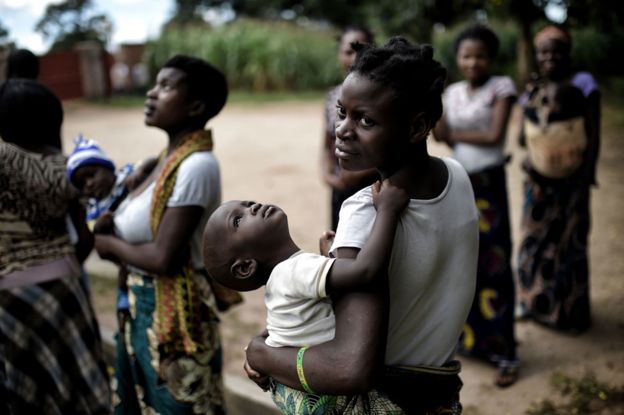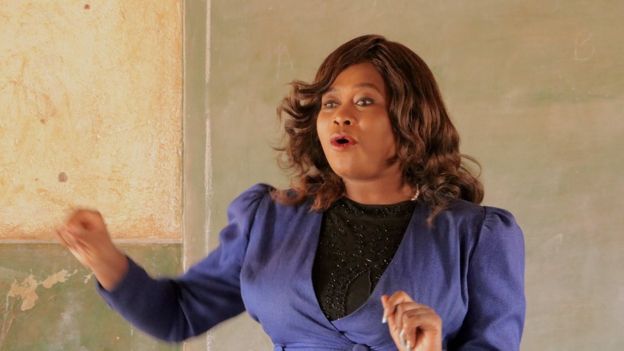In July the BBC wrote about a Malawian man paid to have sex with young girls from his village, as part of a sexual initiation ritual. Later a Malawian woman, Natasha Annie Tonthola, contacted the BBC to explain how her experience of the ritual helped inspire her to campaign for the protection of women and girls. This is her story.
I'm the oldest of five children and I grew up in a village in the central district of Malawi, near the capital, Lilongwe, and I was 13 years old when the initiation ceremony happened.
My father was from a village near Mulanje, in the south of the country, and I was sent there for the ceremony after my first period. You don't have a choice - it happens to every girl in the village.
We were told that we were going to learn about womanhood, and to be honest I was excited. So was every other girl.
On the last day one of the female elders told us that we had reached the final part of the process. She said a hyena was coming to visit us. "Don't worry, I'm not talking about an animal," she said. "I'm talking about a man."
But we didn't actually know what a hyena is, or what he was going to do. They don't tell you he's going to have sex with you.
We each had a piece of cloth and we were told to put it on the floor. We were told that it was time to show that we knew how to treat a man, that we knew what to do for our future husbands. Then we were blindfolded.
You're not supposed to show you're scared, you're not supposed to show you don't know what's happening to you.
The man comes, and he tells you to lie down, you open your legs and he does what he does. We weren't allowed to know who the man was - only the elders know.
We were young girls, so we were tense, and this man would push our legs open. I found it painful. When he finished, I was relieved. The female elder came in and said, "Congratulations, you have finished the initiation ceremony, and you are a woman now."
Many girls think this is normal because we are in a way brainwashed, we think it is OK because it is tradition.
But the hyena didn't use protection and some of the girls got pregnant.
When we got back home, we weren't allowed to chat or play with girls who hadn't already been through the ceremony. I wasn't allowed to tell my younger sister anything about it. Girls are entering puberty earlier, and getting their periods at a younger age, so now the ceremony is happening to girls as young as 10 or 11 years old.
After the ceremony my life took a turn for the worse. My father, who was a policeman, died the following year.
The tradition of "wife inheritance" says that the brother of a man who dies should marry the widow, to provide for the family, but my mother refused to follow this custom.
Instead, we moved to South Africa, as my mother is half South African and my uncle invited us there to make a fresh start. We both took jobs to make ends meet - I lied about my age and got jobs in a salon and a kitchen. I also worked as a housekeeper. But despite working hard, we didn't have enough money to pay my school fees or to support our family.
Then, through my relatives back in Malawi, I found out that there was a man who was willing to pay my school fees as long as I agreed to marry him. I was about to turn 16, and I didn't want to get married so young. My mother didn't want me to either. But I was desperate to finish my education, and worried about my siblings and my mother, who was working so hard it was affecting her health. So I said yes and we all moved back to Malawi.
We had a traditional marriage and he started paying for my secondary schooling and supporting my entire family. He was 15 years older than I was, he was educated, and was a successful businessman, but he was physically abusive. He beat me all the time. I still have scars on my body from my marriage.
I got pregnant at age 17, but fortunately I was able to take my exams before I gave birth to my daughter. My husband was still abusive - I almost had a miscarriage - and he was having affairs the entire time we were together. I was broken. This was not how I wanted my life to be, and I knew my husband was doing this to me because I was young and vulnerable, and didn't have anywhere else to go. I was trapped.
It was at this point that my uncle in South Africa came to the rescue again. He knew I was passionate about fashion, and arranged for me to enrol in a fashion design course.
My husband always told me that if I left him, he'd hunt me down and kill me. So I had to lie, and tell him, "I'll be home in a week or two." But I did not go back. Instead I did the course, and supported myself by working in a restaurant.
Eventually I went back to Malawi and started designing clothes for influential people. I also opened a restaurant - cooking is another big passion of mine, it's my version of therapy. And I started a community organisation working on a variety of issues, from keeping girls in school by fighting early marriage, educating people about rituals and traditions - including hyenas - which put girls at risk, and teaching about HIV/Aids, unwanted pregnancies and reproductive health.

My troubles with my husband were not over, however. When he found out I was back in Malawi he started stalking me. He would say things like: "If I can't have you, nobody else can."
One day he came to the house that I was living in. I don't know how he got my address, but he seemed calm, so I let him inside. He said he wanted to see me, and that he also wanted to see his daughter, who was at that time three years old. He told me he loved me, that he was sorry and that he was a changed man.
"We're still married, and I've done so much for you," he said. "If it wasn't for me paying your fees and taking you and your miserable family in, you wouldn't have become what you are today. You owe me."
I told him: "Once bitten, twice shy."
I certainly didn't want to get back together with him. He shouted and threw things and then he started choking me - even though my daughter was sitting on my lap. He would have killed me if the neighbours hadn't heard my screams. They burst in and threw him out. I didn't press criminal charges, I didn't want to make my case more public than it already was. But I did get a restraining order to keep him away from me.

All the while, something was bubbling up inside me, and I knew that what had happened to me in my life was happening to other girls and women.
My community organisation continued to educate people but it was hard, particularly when we were challenging traditions such as the use of hyenas and wife inheritance.
In some communities they told us: "Just because you are educated, doesn't mean that you should tell us what to do. These traditions and customs have existed for time immemorial, and we've practised them for ages without any harm."
But some elders and religious leaders listened, and some have stopped the practice in their villages.
In my community work I soon learned more about the barriers for girls in school. If families are going through a financial rough patch, they're more likely to pay fees for boys rather than for girls. If girls drop out of school, the family is eager to marry them off rather than have them sit around the house all day. And many girls miss class because they can't afford sanitary towels.
To try to solve this problem, one of the main things my organisation is doing is distributing eco-friendly reusable washable sanitary pads and pants. They come as part of a kit including pants with clips so that they stay in place and a waterproof bag, in case girls need to change them in school. They are biodegradable, but cost effective and durable - they last for five years. I've also expanded into nappies. I hope these will encourage much less waste to go into landfill.
In 2011 I realised I needed to establish a formal organisation, and that was the start of Mama Africa Foundation Trust. We have distributed so many sanitary towels that I have lost count. I call this initiative Project Dignity.
Despite everything that's happened I'm optimistic about the future. I think there is so much we can do for the women and children who are victims of hyenas, of gender-based violence, and all the other social evils and challenges that are out there. It will be tough, but I have hope.
Latest Stories
-
‘Nothing off the table’ in Canada’s response to US tariff threat
41 minutes -
New suspected Marburg outbreak in Tanzania kills eight – WHO
56 minutes -
Kenyan minister alleges intelligence agency behind his son’s abduction
1 hour -
No more miners trapped underground in South Africa, volunteers say
1 hour -
US issues fresh round of sanctions against Russia ahead of Trump return to White House
2 hours -
Death toll from South African mine siege rises to 78, rescued now at 166
2 hours -
Biden takes aim at ‘tech industrial complex’ in farewell speech
2 hours -
Biden says Gaza deal based on his framework while Trump claims credit
2 hours -
Ex-convict, 22, jailed in Tarkwa for threatening to stab student
4 hours -
The would-be African nation in love with Donald Trump
4 hours -
‘We’re not investigating, we’re validating’ – Domelevo clarifies ORAL Committee’s role
5 hours -
JoyNews poll: Akufo-Addo, his government’s ‘killer’ taxes and nepotism blamed for NPP’s 2024 defeat
5 hours -
Malian PM arrives in Accra with special message for Mahama
5 hours -
What happens if TikTok is banned in US?
5 hours -
US bans red dye 3 from some frosting, candy and medicine
6 hours

